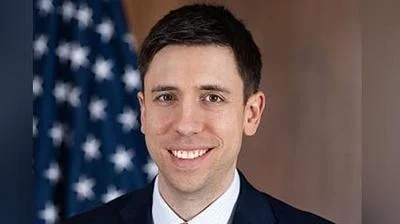Scott Reeder
Scott Reeder
For the first time in my life, this week I put a “political” sign in my front yard.
It is a “Black Lives Matter” post.
The video of George Floyd’s death was horrifying. Minneapolis Police Officer Derrek Chauvin knelt for almost nine minutes on Floyd’s neck as he repeatedly said he could not breathe.
A bystander with a cell phone video recorded the entire encounter.
Chauvin knew he was being recorded and stared straight into the camera lens as he continued to bear his weight down on Floyd. These are the actions of a man who believed there would be no repercussions for his actions.
More disturbing still is that three police officers stood nearby and watched as it happened. Not one of them interfered to save a man’s life. The code of silence remains pervasive throughout the police culture.
I’ve covered police departments in communities as diverse as Las Vegas; Galveston, Texas; and Davenport, Iowa.
And for the past four years, I have investigated more than 50 wrongful convictions across the United States. My podcast Suspect Convictions has cataloged case after case of people who have served decades in prison for crimes they did not commit.
These convictions didn’t just happen. In almost every one of those cases, the conviction was preceded by acts of police misconduct such as perjury, torture and manufacturing of evidence.
Sadly, in almost all of these cases, no disciplinary action was taken against the offending officers.
“It is virtually unheard of for a police officer to be fired for misconduct and next to unheard of for him to prosecuted for it. Even reprimanding a police officer is difficult. Police unions are incredibly regressive forces against reform,” said Larry Golden, founding director of the Illinois Innocence Project.
This crisis of accountability is nothing new. It has been happening for generations in law enforcement. And the misconduct disproportionately hurts those with black and brown skin.
While there are many, many good officers faithfully serving our communities, I’ve also observed more than my share of bigots.
Years ago, I walked into a detective bureau and inquired about a neighborhood altercation from the previous evening. A detective gave me a smirk and said that was nothing but TNA – Typical Negro Activity.
The squad rooms and offices within the police departments I’ve covered are places where racial epithets are common. No, not all officers say them. In fact, most don’t. But comments that would get one fired in most private places of employment are said there with little to no repercussions. The code of silence remains pervasive.
In the wake of George Floyd’s death, communities are rightly demanding reform.
In some cities there is a push to defund police departments. While I appreciate the understandable anger behind such sentiments, I believe the notion is misplaced.
After all, police perform a vital function in our society.
What we need is comprehensive reform.
We should:
- Make field training officer positions prestigious, well-paid assignments that only the highest performers qualify for. It’s worth noting that Chauvin was assigned to an FTO position despite having 18 previous complaints filed against him. The day of Floyd’s death, he had two rookies shadowing him. If you want better cops, find better teachers.
- Make police unions responsible for providing liability insurance for their members. Currently, unions defend even the most egregious actions of officers. Giving them some financial skin in the game creates an incentive for them to help cull the worst officers.
The Justice in Policing Act of 2020 would:
- Remove the barriers to prosecuting police misconduct and recovering damages from officers who have violated civilians’ rights and end qualified immunity for law enforcement.
- De-militarize police by limiting the transfer of military weaponry to state and local police departments.
- Combat police brutality, including by requiring body and dashboard cameras, banning chokeholds and enacting steps to end racial profiling.
- Step up pressure on the Justice Department to address systemic racial discrimination by law enforcement.
- And make lynching a federal hate crime.
Let us hope that those who represent us will have the courage to make these reforms reality.
– Scott Reeder is a veteran statehouse journalist and a freelance reporter. ScottReeder1965@gmail.com.





 Alerts Sign-up
Alerts Sign-up